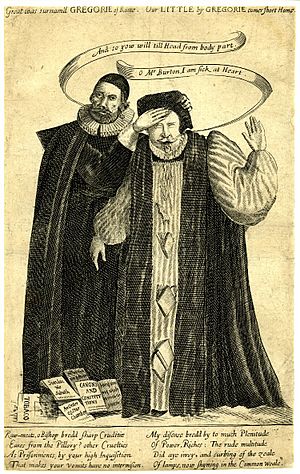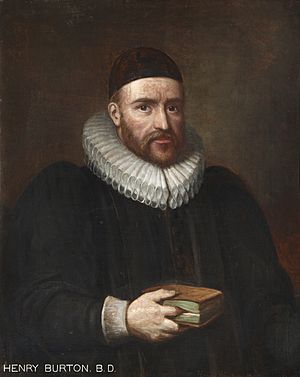Henry Burton (theologian) facts for kids
Henry Burton (1578–1648) was an English puritan. Puritans were a group of Protestants who wanted to make the Church of England simpler. They believed the church should be more like the early Christian church.
Burton, along with John Bastwick and William Prynne, faced harsh punishment in 1637. Their ears were cut off because they wrote pamphlets. These writings strongly criticized the ideas of Archbishop Laud, who was a powerful church leader.
Contents
Early Life and Education
Henry Burton was born in a small village called Birdsall in 1578. His father was William Burton. Henry went to St. John's College, Cambridge, a famous university. He earned his Master of Arts degree in 1602. He admired preachers like Laurence Chaderton and William Perkins. After college, he worked as a tutor for the sons of Sir Robert Carey.
Working for the Princes
Because of his connection to the Carey family, Burton got a job working for Henry Frederick, Prince of Wales. He became the Prince's Clerk of the Closet. This job involved helping the Prince with his religious duties and writings. While working for Prince Henry, Burton wrote a book about the Antichrist.
After Prince Henry died in 1612, Burton became the Clerk of the Closet for Prince Charles. He wanted to become a minister when he was thirty years old. Burton wrote a book in 1623 against a Jesuit named John Percy. He wanted to argue against certain religious ideas and show that the Pope was the Antichrist.
Conflict with King Charles I
When Prince Charles became King Charles I, Burton expected to keep his job. However, another church leader, Richard Neile, kept the position. Burton lost his chance because he was too direct. In 1625, he wrote a letter to King Charles. In this letter, he complained about the Catholic-like ideas of Neile and William Laud. King Charles read part of the letter and told Burton not to come back to court.
Burton then became the rector of St. Matthew's, Friday Street, a church in London. He used his sermons to speak out against the practices of the bishops. He believed they were making the church too similar to the Catholic Church. In 1626, he was called before the Court of high commission. This court dealt with religious matters. However, the case against him was stopped.
Burton continued to criticize church leaders. In 1629, he wrote a book called Babel no Bethel. This led to him being temporarily suspended from his church job. He was also sent to the Fleet Prison for a short time.
Sermons and Arrest
On November 5, 1636, Burton preached two sermons. He accused the bishops of bringing in new ideas that were part of a "popish plot." He used strong words, calling the bishops "caterpillars" and "antichristian mushrumps." The next month, he was called to answer questions about his sermons. He refused to take an oath and appealed to the King.
Fifteen days later, he was ordered to appear before a special court. He did not show up. The court then suspended him and ordered his arrest. Burton stayed in his house and published his sermons. He called the book For God and the King (1636). On February 1, 1637, his house was broken into. He was arrested and sent to the Fleet Prison.
Star Chamber Trial
In prison, Burton was joined by William Prynne and John Bastwick. These men had also written books against the church leaders. The three were put on trial together in the Star-chamber court on March 11. They tried to submit their defenses, but it was very difficult.
Harsh Sentence
The Star Chamber passed sentence on June 14. Burton and the others cried out for justice. They said they should not be condemned without their defenses being heard. Burton argued that a minister should have the freedom to speak strongly. His defense was stopped.
He was found guilty and given a very harsh punishment. He was removed from his church job. He was also stripped of his ministry and university degrees. He was fined £5,000, which was a huge amount of money. He was also ordered to stand in the pillory in Westminster. His ears were cut off. Finally, he was sentenced to be imprisoned forever in Lancaster Castle. He was not allowed to see his wife or friends. He also could not use a pen, ink, or paper. Archbishop Laud thanked the court for this sentence.
Burton's church members signed a petition asking the King for his pardon. But the two people who delivered it were put in prison. After his ears were cut, people lined the road to say goodbye to him as he was taken north. His wife followed him, and many people rode with him. At Lancaster, Burton was held in a poor room. He was later sent to Guernsey on November 1, where he was held in a cell at Castle Cornet. He had very few books there. He was not allowed to see his wife, and his only daughter died while he was in prison.
Release and Later Life

On November 7, 1640, Burton's wife asked the House of Commons for his release. The House ordered him to be sent to London. He arrived in Dartmouth on November 22 and met Prynne. Their journey to London was like a victory parade. Many people came out to greet them.
On November 30, Burton appeared before the House of Commons. On December 5, he presented a petition. On March 12, 1641, the House declared that the actions against him were illegal. They ordered that Laud and others pay damages. On March 24, his sentence was reversed. His church job was ordered to be given back to him. He also got his university degrees back. However, he did not receive the money he was owed, nor did he get his church job back right away.
In 1642, his old church members asked that he be made a Sunday afternoon lecturer. This was approved. Burton then organized his church based on independent ideas. He preached before Parliament. However, he did not agree with all the new changes happening in the country. He suffered from kidney problems during his imprisonment, which likely caused his death. He was buried on January 7, 1648.
Writings
Henry Burton wrote several books and sermons. One important work was Protestation Protested, published in 1641. This book suggested a plan for a national church that allowed for other independent churches to exist. This idea was later used in England. He also wrote A Vindication of Churches commonly called Independent in 1644.
Some of his other main publications include:
- A Censvre of Simonie, 1624.
- A Plea to an Appeale, 1626.
- The Seven Vials; or a briefe Exposition upon the 15 and 16 chapters of the Revelation, 1628.
- A Tryall of Private Devotion, 1628.
- England's Bondage and Hope of Deliverance, 1641.
- Truth still Truth, though shut out of doors, 1645.
- The Grand Impostor Unmasked, a book criticizing Archbishop Laud.
- Conformities Deformity, 1646.
See also
- Nathaniel Holmes
 | Calvin Brent |
 | Walter T. Bailey |
 | Martha Cassell Thompson |
 | Alberta Jeannette Cassell |


